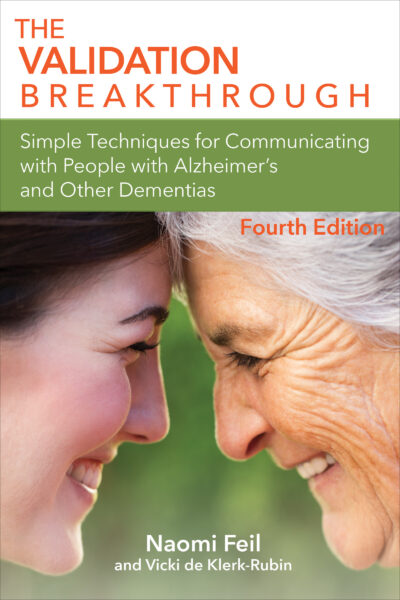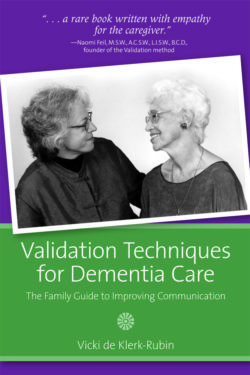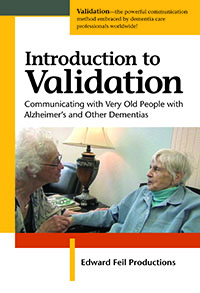Product Description
Since the 1980s, the Validation method has been recognized worldwide as a reliable and effective approach used by care staff and families to communicate with people experiencing memory loss and disorientation. Put into practice, it can relieve distress and confusion, promote dignity, improve engagement, and reduce conflicts.
This easy-to-read book explains the essential principles and practices of Validation and illustrates them with compelling stories and photos. When a person’s actions or expressions seem inexplicable, the Validation method is a tool to bridge the gap and connect with that person’s reality. Care providers gain powerful tools for improving lives by focusing on the social and psychological needs of the person experiencing dementia.
Through case studies presented by a variety of practitioners, see how Validation works in different care settings. Also in this revised edition, learn how to:
- Choose the best strategies to use for each situation or phase
- Use empathy and compassion to build trusting relationships with residents
- Move beyond facts to relieve hidden sources of stress, fear, and anger
- Interpret nonverbal cues to promote better engagement
This resource is essential for professionals in all settings serving adults with memory loss. The Validation method empowers care partners to achieve surprising results and connections—in all manner of circumstances. Enjoy the many benefits of breaking through dementia to touch the true lives within.
Benefits of Validation:
- Residents express less anger and anxiety
- Use of antipsychotic medications declines
- Improved communication produces increased engagement and feelings of self-worth
- Residents often exhibit more flexibility and strength in their movements
- Staff members feel better prepared to handle difficult situations
- Work-related stress and burnout diminish
- Families experience more joy in their relationships with loved ones


 Naomi Feil, M.S.W., ACSW (1932–2023), was the Founder of the Validation Training Institute. She was the originator of Validation, currently recognized throughout the world as a state-of-the-art method for communicating with older adults diagnosed as having neurocognitive disorders (NCDs) due to Alzheimer's disease or other forms of dementia.
Ms. Feil earned her master's of social work degree from Columbia University and studied at the New School for Social Research, Case Western Reserve University, and the University of Michigan. In 1963, she became dissatisfied with traditional therapies for older people with dementia and began to develop her own methods for helping older people cope with the cognitive impairment that is sometimes part of the aging process.
In addition to her earlier book on Validation, Ms. Feil published numerous journal articles and, in collaboration with her husband Edward R. Feil, a documentary filmmaker, produced nine award-winning films on Validation. The Validation Breakthrough has sold more than 55,000 copies in the United States alone in previous editions. She is internationally recognized for her work with older people and was one of the most sought-after trainers in the field. More than 30,000 facilities in the United States, Canada, Europe, Australia, and Japan have adopted Validation, and nearly 90,000 professional and family caregivers have attended her workshops in North America, Europe, Australia, and Asia. There are 23 Validation centers that teach Validation certification courses in 13 countries.
Naomi Feil passed away on December 24, 2023 at the age of 91.
Naomi Feil, M.S.W., ACSW (1932–2023), was the Founder of the Validation Training Institute. She was the originator of Validation, currently recognized throughout the world as a state-of-the-art method for communicating with older adults diagnosed as having neurocognitive disorders (NCDs) due to Alzheimer's disease or other forms of dementia.
Ms. Feil earned her master's of social work degree from Columbia University and studied at the New School for Social Research, Case Western Reserve University, and the University of Michigan. In 1963, she became dissatisfied with traditional therapies for older people with dementia and began to develop her own methods for helping older people cope with the cognitive impairment that is sometimes part of the aging process.
In addition to her earlier book on Validation, Ms. Feil published numerous journal articles and, in collaboration with her husband Edward R. Feil, a documentary filmmaker, produced nine award-winning films on Validation. The Validation Breakthrough has sold more than 55,000 copies in the United States alone in previous editions. She is internationally recognized for her work with older people and was one of the most sought-after trainers in the field. More than 30,000 facilities in the United States, Canada, Europe, Australia, and Japan have adopted Validation, and nearly 90,000 professional and family caregivers have attended her workshops in North America, Europe, Australia, and Asia. There are 23 Validation centers that teach Validation certification courses in 13 countries.
Naomi Feil passed away on December 24, 2023 at the age of 91.  Vicki de Klerk-Rubin, R.N., M.B.A., is a Validation Master Teacher and the Executive Director of the Validation Training Institute (VTI). As the daughter of Naomi Feil, she strives to continue the legacy her mother started by ensuring that the VTI remains strong and committed to spreading the method she developed with integrity, creativity, and love.
Ms. de Klerk-Rubin assisted in the development of Authorized Validation Organizations (AVOs) throughout the world. She is especially proud of her work with other Validation Teachers in developing the standardized curricula, the Quality Manual, and certification levels. More recently, she has focused on developing online Validation training as well as training for specific groups of people: Validation for Family Caregivers and Validation for First Responders. Each training is focused on the needs of the participant. Every online course follows strict quality standards for online pedagogy.
Ms. de Klerk-Rubin received her master's degree in business administration from Fordham University (1983) and a nursing degree from Hogeschool Holland, Amsterdam (1997). She has published numerous articles on Validation in Dutch and British magazines and is co-author on revisions of Naomi Feil's publications. Her book
Vicki de Klerk-Rubin, R.N., M.B.A., is a Validation Master Teacher and the Executive Director of the Validation Training Institute (VTI). As the daughter of Naomi Feil, she strives to continue the legacy her mother started by ensuring that the VTI remains strong and committed to spreading the method she developed with integrity, creativity, and love.
Ms. de Klerk-Rubin assisted in the development of Authorized Validation Organizations (AVOs) throughout the world. She is especially proud of her work with other Validation Teachers in developing the standardized curricula, the Quality Manual, and certification levels. More recently, she has focused on developing online Validation training as well as training for specific groups of people: Validation for Family Caregivers and Validation for First Responders. Each training is focused on the needs of the participant. Every online course follows strict quality standards for online pedagogy.
Ms. de Klerk-Rubin received her master's degree in business administration from Fordham University (1983) and a nursing degree from Hogeschool Holland, Amsterdam (1997). She has published numerous articles on Validation in Dutch and British magazines and is co-author on revisions of Naomi Feil's publications. Her book 

HPP Admin –
“This book will transform how you communicate. I have watched people with dementia-related illnesses come to life as teams in our senior living communities use Validation, and I have witnessed family caregivers have intimate moments again when they learn and use this approach.”
-Kevin Carlin, M.S., Principal, Meridian Senior Living
HPP Admin –
“A true pioneer, Naomi Feil is considered the first care professional to take the emotions of older adults living with Alzheimer’s disease seriously. Her Validation method helps us support individuals in achieving the highest practicable well-being.”
-Eilon Caspi, Ph.D., author, Understanding and Preventing Harmful Interactions Between Residents with Dementia